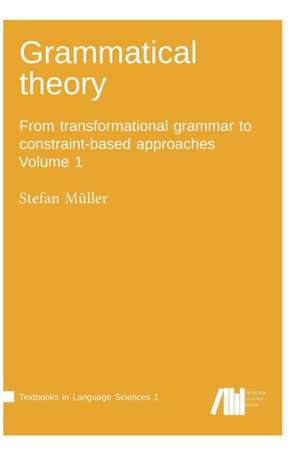Grammatical theory Vol. 1: Textbooks in Language Sciences 1
Autor Stefan Mülleren Limba Engleză Hardback – 16 mai 2017
| Toate formatele și edițiile | Preț | Express |
|---|---|---|
| Paperback (1) | 236.85 lei 3-5 săpt. | |
| Language Science Press – 17 mai 2017 | 236.85 lei 3-5 săpt. | |
| Hardback (1) | 336.41 lei 3-5 săpt. | |
| Language Science Press – 16 mai 2017 | 336.41 lei 3-5 săpt. |
Preț: 336.41 lei
Nou
Puncte Express: 505
Preț estimativ în valută:
64.40€ • 66.94$ • 53.40£
64.40€ • 66.94$ • 53.40£
Carte disponibilă
Livrare economică 15-29 ianuarie 25
Preluare comenzi: 021 569.72.76
Specificații
ISBN-13: 9783946234296
ISBN-10: 3946234291
Pagini: 568
Dimensiuni: 175 x 246 x 41 mm
Greutate: 1.1 kg
Editura: Language Science Press
Colecția Textbooks in Language Sciences 1
Seria Textbooks in Language Sciences 1
ISBN-10: 3946234291
Pagini: 568
Dimensiuni: 175 x 246 x 41 mm
Greutate: 1.1 kg
Editura: Language Science Press
Colecția Textbooks in Language Sciences 1
Seria Textbooks in Language Sciences 1
Notă biografică
Stefan Müller studied Computer Science, Computational Linguistics and Linguistics at the Humboldt University at Berlin and in Edinburgh. He worked at the German Research Center of Artificial Intelligence (DFKI) in Saarbrücken and for the company Interice. He worked as acting chair for German and Computational Linguistics in Jena and for Theoretical Computational Linguistics in Potsdam. He had an assistant professorship in Bremen for theoretical linguistics and computational linguistics, a full professorship for German and General Linguistics at the Freie Universität Berlin and is now professor for German language with specialization in syntax at the Humboldt-Universität zu Berlin. His main research topic is German grammar. He works both empirically and theoretically. Topics of interest are morphology, syntax, semantics, and information structure. He published mainly about German, but he also works on other languages as for instance Mandarin Chinese, Danish, Maltese, and Persian. The theoretical work is carried out in the framework of Head-¿Driven Phrase Structure Grammar (HPSG) and the theoretical analyses are implemented in computer-¿processable grammar fragments. The grammar fragments that are implemented in the CoreGram Project use a common core. One goal of his research is to understand language and to find out what languages in general and certain language classes in particular have in common.



